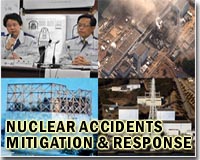| . |  |
. |
Tokyo (AFP) May 17, 2011 Japan's Tokyo Electric Power Company on Tuesday said its plan to end the crisis at its stricken nuclear plant was on schedule, despite signs that damage to the facility was worse than initially thought. The operator of the Fukushima Daiichi nuclear power station said it still expected to reduce radiation leaks by July and bring its reactors to a stable cold shutdown by January at the latest, in line with last month's plans. But it altered efforts to cool the plant's number one reactor by filling its containment chamber with water, after discovering thousands of tons of highly radioactive contaminated waste water had leaked into the reactor basement. TEPCO vice president Sakae Muto told a news conference the company had "revised" its original plan and would set up a facility to cleanse and circulate the water. The system will also be used in reactors two and three. Japan's March 11 earthquake and tsunami left nearly 25,000 people dead or missing. Cooling systems at the Fukushima plant were disabled, leading reactors to overheat, triggering the worst nuclear incident since Chernobyl 25 years ago. The crisis has prompted Japan to review its national energy policy to boost its use of atomic power as tens of thousands of people remain evacuated from homes, farms and businesses in a 20-kilometre (12-mile) zone around the plant. "The government must face up to their (evacuees') feeling of being betrayed," Trade Minister Banri Kaieda told reporters Tuesday. "Nuclear energy has been a policy promoted by a country with poor natural resources. I would say they are the victims of the national policy." The compensation bill is estimated to run as high as 10 trillion yen ($122 billion). The government said it would ensure 15,200 temporary houses to shelter nuclear refugees are constructed in Fukushima prefecture by early August, and would offer healthcare services and financial support for local businesses. Recent TEPCO updates have confirmed experts' fears that fuel rods inside reactor one had been fully exposed to the air and had melted, and that reactors two and three were likely in a similar condition. In the immediate aftermath of the quake, TEPCO said only partial meltdowns had likely occurred. The government has moved to evacuate residents from villages originally outside the 20-kilometre exclusion zone around the crippled facility. Some 4,000 residents of Iitate-mura village and 1,100 people in Kawamatamachi town in the quake-hit northeast on Sunday began phased relocation to public housing, hotels and other facilities in nearby cities. An International Atomic Energy Agency (IAEA) investigation team will arrive in Japan next week to probe the nuclear crisis, the government said Tuesday. The group of 20 nuclear experts will visit from May 24 to June 2, Chief Cabinet Secretary Yukio Edano told a news conference. TEPCO and the government have yet to release estimates for the payout bill, but analysts say it could range from four trillion yen ($50 billion) to 10 trillion yen, depending on how long the crisis lasts. Tokyo last week unveiled a plan to provide aid to the company and protect it from bankruptcy, partly using state funds. The government's top spokesman said lenders may have to waive loans made to TEPCO before the disaster. Ratings agency Moody's on Monday again downgraded TEPCO and warned the rating would remain on review for further possible action. dwa-yi-si-oh/ft/adm
Share This Article With Planet Earth
Related Links Bringing Order To A World Of Disasters A world of storm and tempest When the Earth Quakes
 Doctors defy radiation woes in Japan's Fukushima
Doctors defy radiation woes in Japan's FukushimaFukushima City, Japan (AFP) May 17, 2011 When other doctors fled, 72-year old Kyohei Takahashi stayed, and hundreds of patients in the tsunami-hit Japanese town of Minamisoma near a crippled nuclear plant will never forget. Dr. Takahashi has defied radiation fears and worked gruelling hours for the past nine weeks to do what he considers his duty. "As a doctor, I thought, I shouldn't retreat," he said. "I told myself: who will ... read more |
|
| The content herein, unless otherwise known to be public domain, are Copyright 1995-2010 - SpaceDaily. AFP and UPI Wire Stories are copyright Agence France-Presse and United Press International. ESA Portal Reports are copyright European Space Agency. All NASA sourced material is public domain. Additional copyrights may apply in whole or part to other bona fide parties. Advertising does not imply endorsement,agreement or approval of any opinions, statements or information provided by SpaceDaily on any Web page published or hosted by SpaceDaily. Privacy Statement |